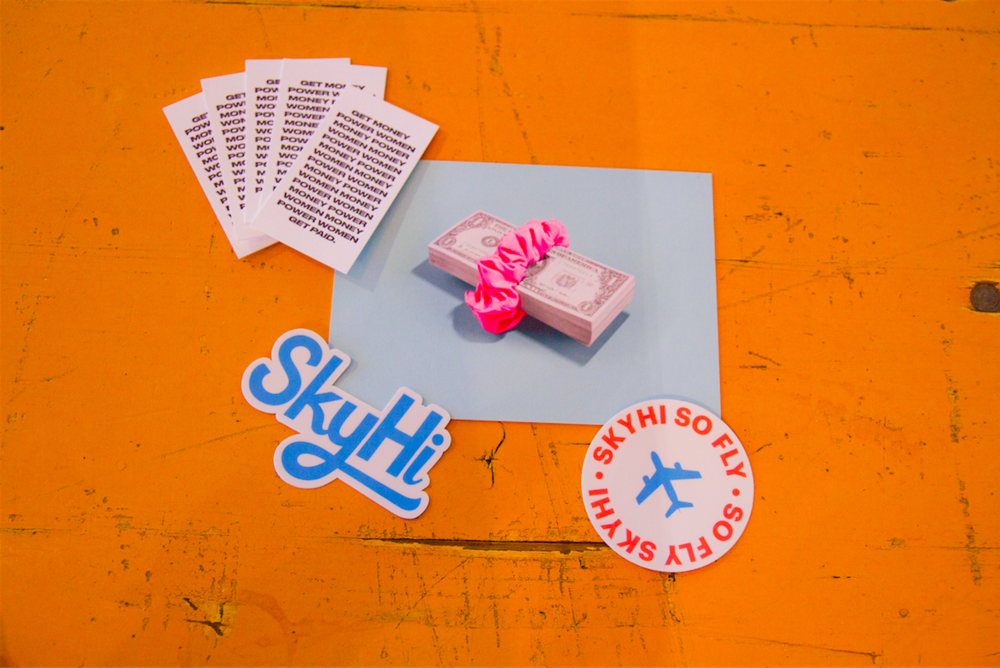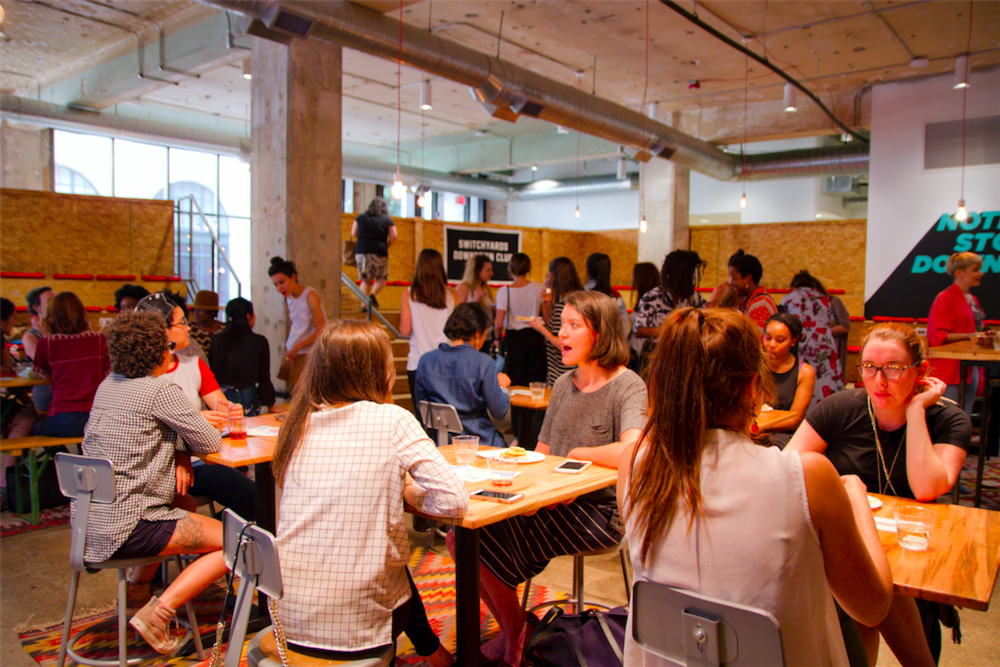
This is a recap of our Women & Money Town Hall in Atlanta on June 15, 2017, at Switchyards Downtown Club. You can follow the LGP Atlanta community on Instagram and Facebook. Catch all the photos (courtesy of Isadora Pennington!) from our first event here.
We’re thrilled to have partnered with SkyHi to help make this event possible. They are an amazing soon-to-launch membership service that allows you to book one-way flights for $35. Pretty insane. Check them out at flyskyhi.com for information on how to sign up.
Atlanta’s first town hall was a night for community building. On a cloudy Thursday, an inspiring group of women came together at Switchyards Downtown Club to learn about Ladies Get Paid and talk work and money. And though the differences in the room were apparent — different social circles, different backgrounds, different industries — everyone walked out with something in common: they all became members of a larger community of go-getting women.
No matter what set these women apart, they were all brought together by a desire for more. More confidence, more power and, of course, more money. And in true Ladies Get Paid fashion, every woman in the room worked to make these things a reality by sharing with each other. Panelists and attendees shared their stories, offered up their time and passed on lessons learned.
They also lifted each other up. The biggest theme of the night was the idea of “imposter syndrome” and how, as women, we all tend to suffer from it even when we don’t know what it is. (For those who don’t know, it’s the inability to internalize your accomplishments, like you’re faking your way through life and you’ll be exposed as a fraud at any moment.) Our panelists of freelancers, career changers, nonprofit owners and entrepreneurs talked through navigating moments of self-doubt and convincing yourself you’re already good enough the way you are.

KEY TAKEAWAYS:
“You have nothing to prove. You’re already good enough, that’s why you got the job.”
There was a lot of talk about the adage, “give an inch and they’ll take a mile,” and the importance of having boundaries with bosses, clients and coworkers. Porsha Thomas, founder of Ladypreneur League, talked about having a client from hell as a freelancer who turned her off of freelancing entirely, and one of the attendees spoke up about her own issues with working late hours and being too eager and available, because she felt like she had to prove herself. It was a story we could all relate to.
But in one of the best moments of advice from the night, Jaime Weinstein, writer and freelancer, reminded us all that we’re already good enough and have nothing to prove. Otherwise we wouldn’t have gotten the job in the first place.
“If you accept lower rates, you’re lowering the standards of the industry.”
As a freelancer, Jaime was familiar with the difficulties that come with setting your own rates for your work and clients pushing back on what they consider to be “too much.” But you never have to take a lower rate just to get work or exposure — know your worth and demand it.
And freelancers aren’t the only people who struggle with setting rates. Rachelle Knowles, a yoga instructor and founder of Cultivate Union, shared the difficulties of fair pay that yoga instructors face as members of an emerging field. But charging what you’re worth is even bigger than just making sure you get paid. It’s about creating a better standard for everyone in your industry, whatever that may be. Because when you accept lower rates, clients assume that’s the standard, and the next person won’t be paid what they’re worth, either.
“I kept waiting for them to give it to me, and it didn’t happen. I realized that if I’m not assertive and ask for what I want, it doesn’t get the job done.”
Alessandria Struebing left a career that wasn’t fulfilling and started over at the bottom of the restaurant/hospitality ladder — at the host stand. But she had the courage to walk into one of the nicest restaurants in Atlanta and ask for a job, and that led to her asking for more responsibilities and for different positions. Now, she’s a Marketing Director working with an industry she’s passionate about, all because she realized no one will give you what you want unless you ask for it.
“Find a lawyer, make an agreement.”
With several entrepreneurs on the panel, the discussion inevitably shifted toward partnerships and how to approach them. Porsha shared an experience of working with — and being burned by — a friend who stole the magazine she had created because there had been no legal framework around who owned what. Tallia Deljou, Co-Founder of Mavenly + Co., told attendees to look for partners with complementary strengths to add balance, and to always, always hire a lawyer and make an agreement. No matter how nice your partner may seem.
“Money is power. So when you ask for it, you’re asking someone else to give you power. Which creates an automatic feeling of powerlessness.”
Tallia also spoke to one of the reasons we find it so difficult to ask for money. We associate money with power, and power with freedom. Which means asking for money is like asking someone else to give us both power and freedom, and creates a feeling of powerlessness in us. So it’s not just a matter of asking for more — it’s about flipping the association and realizing you already have both power and freedom. Money is just money.




Thank you to our friends SkyHi for making this event possible! They are an amazing soon-to-launch membership service that allows you to book one-way flights for $35. Pretty insane. Check them out at flyskyhi.com for information on how to sign up.

